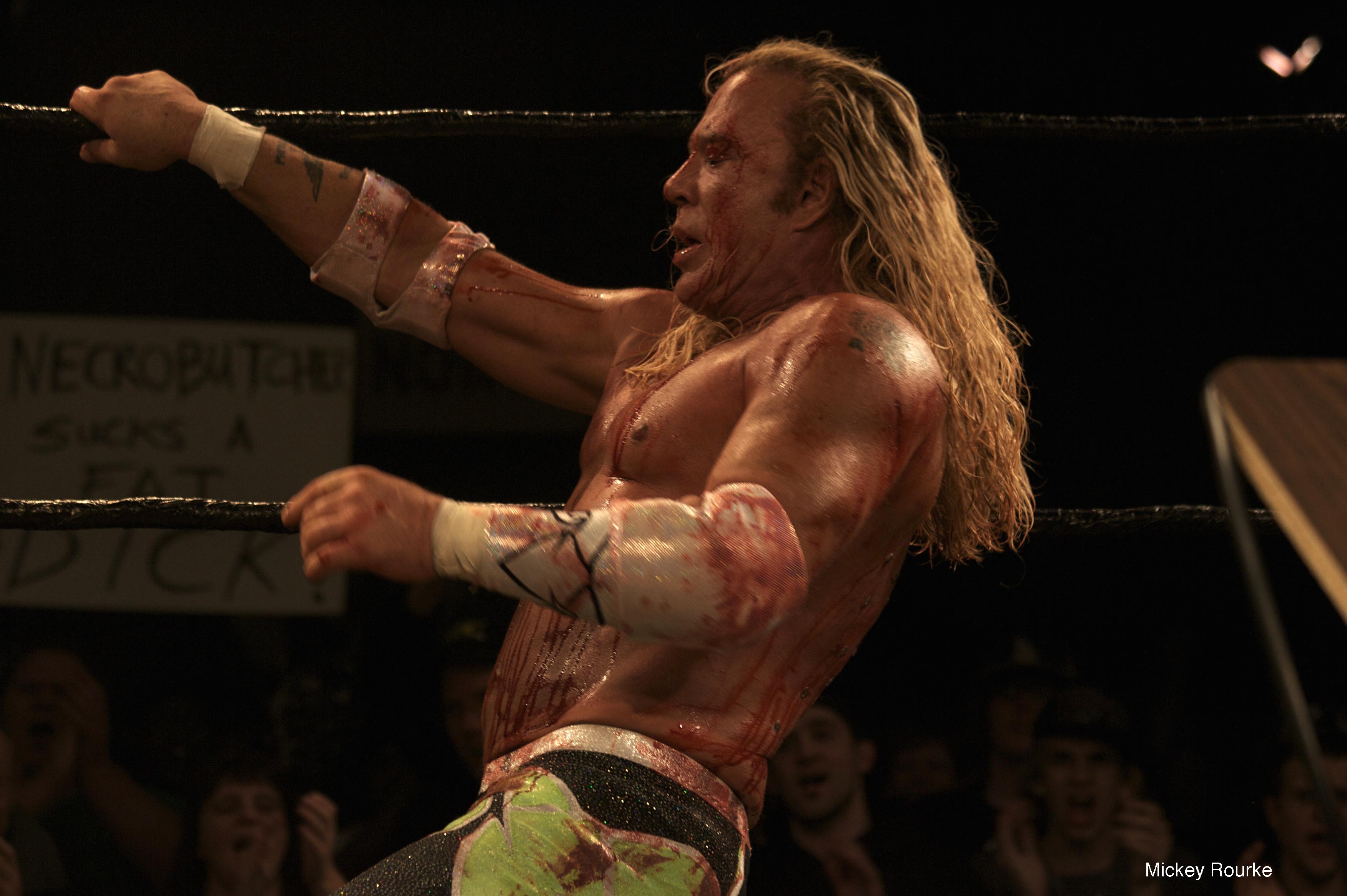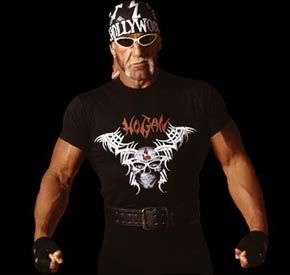 One of the advantages of being in my position (you know, trivia king of New York City), is that I occasionally get the opportunity to see movies before the general public is exposed to them, either via screenings or screeners (industry lingo for advance DVDs sent to critics). For example, I saw The Dark Knight weeks before it exploded messily all over the pop-cultural landscape. Yes, I am blessed.
One of the advantages of being in my position (you know, trivia king of New York City), is that I occasionally get the opportunity to see movies before the general public is exposed to them, either via screenings or screeners (industry lingo for advance DVDs sent to critics). For example, I saw The Dark Knight weeks before it exploded messily all over the pop-cultural landscape. Yes, I am blessed.
So I got just this type of lucky the other day, when a friend passed along a screener of the forthcoming film The Wrestler. Winner of the Golden Lion at the Venice Film Festival (trust me, that's good), it's an incredibly sad and well-done movie starring Mickey Rourke (above) as Randy "The Ram" Robinson, a (fictional) pro-wrestling superstar of the 1980s who finds himself scraping rock bottom in the '00s. Tons of positive hype; I know two film critics who say it's among the best films of the year. Go see it.
But regular BQTers might recall that I have a bit of a fascination with the art of professional wrestling, and occasionally dig out the odd wrestling question (occasionally—I'm not that far gone). And it occured to me while watching this film that for someone not well versed in the wrestling business, some of the lingo might be hard to follow. So as a public service, behold, the BQT's official glossary to professional wrestling terminology:
face—A "good guy" in wrestling (short for "babyface"; in the U.K. they're called "blue-eyes"). Villains are known as heels. As you're no doubt aware, a staple of the wrestling artifice is that it usually pits heroes against villains, and behind the scenes, there's a definite effort to delineate one from the other (a wrestler who is particularly Method in his performance will refuse to even travel with colleagues from the opposite side of the divide). It is common for a wrestler to switch allegiances—to "turn heel" or "turn face"—in order to freshen his character or inspire a new storyline; very few successful wrestlers stick to only one side throughout their career. Even Hulk Hogan—who was the mainstream epitome of the pro-wrestling hero in the 1980s: … turned heel in the '90s:
… turned heel in the '90s:
job—To lose. A perennial loser is a jobber (usually no-name guys who aren't even expected to be competitive). Pro wrestling, of course, is not a competitive sport, and match outcomes are determined beforehand, so there is generally little shame in losing. When you're starting out, you pay your dues to more established performers by jobbing to them; likewise, a wrestler whose best days are behind him is expected to job to up-and-coming stars, to put them over.
gas—Steroids. A wrestler on the gas is using steroids. It is not uncommon—wrestling is a difficult profession, and wrestlers are expected to put their body through extreme punishment on a near nightly basis, and look like Greek gods while doing it. Steroids help, both in building muscle mass and speeding recover time. In the early 1990s, there was a major crackdown on rampant drug abuse in the pro-wrestling business, nearly shutting down the World Wrestling Federation (now World Wresling Entertainment), then as now the dominant promotion in the business.
blade—To purposely cut oneself in order to add blood (or juice) to a wrestling match. Very dangerous, but very common, even in the era of AIDS. A great moment in The Wrestler shows, in detail, Mickey Rourke's character breaking off a razor blade and hiding it in his wrist tape, to use on his forehead during the match. This is some rough shit.
kayfabe—The code of pro wrestling, its own omerta. To keep kayfabe is to pretend—to fans, journalists and all other outsiders—that wrestling is indeed "real": the performers are their characters, the rivalries are genuine, the match outcomes are not predetermined. Kayfabe has broken down greatly in the past ten or fifteen years, partly due to the rise of the Internet (it's harder to keep secrets) and partly because the WWE has looked to become more mainstream and less secretive (hence the label "sports entertainment"). I'm not sure where this word comes from, but I think I read that it grew out of some old carny lingo thing.
fake—A pretty easy label for pro wrestling, which misses the point. Yeah, it's "fake." So is theater, so are TV shows. William Shatner didn't really captain a starship either, and the guy playing Hamlet is still alive after Shakespeare in the Park closes.
BTW, the Super Mega Ultra Hard Question of the Week will be back next weekend. See you tomorrow night at Crash Mansion…
December 7, 2008
Allow me to recommend…
Posted by
The Big Quiz Thing
at
4:58 PM
![]()
Labels: glossary, hulk hogan, lingo, mickey rourke, pro wrestling, terminology, the wrestler
Subscribe to:
Post Comments (Atom)


5 comments:
...please where can I buy a unicorn?
Visit my blog
AOFIEASDCYMOHWYG [url=http://ow.ly/5RzG9]old navy coupons[/url] feeefffefrlyr
ugg boots on sale
discount ugg boots
dansko outlet
ugg sale
uggs on sale
ugg uk
ugg boots on sale
ugg boots clearance
ugg outlet
discount ugg boots
cheap ugg boots
ugg boots clearance
cheap uggs for sale
ugg outlet
uggs outlet
celine outlet
ray ban sunglasses
cheap ugg boots
roshe run
chi flat iron
ugg boots clearance sale
uggs on sale
ugg black friday
new balance shoes
discount uggs
tory burch black friday
fendi handbags
ugg boots for kids
cheap uggs
cheap uggs uk
michael kors bags
cheap ugg boots for sale
kate spade
chaussures louboutin
oakley vault
michael kors outlet store
cat boots
adidas nmd runner
cheap oakley sunglasses
oakley sunglasses outlet
ralph lauren outlet
nike roshe one
tigers jerseys
170623yueqin
Post a Comment